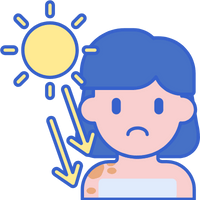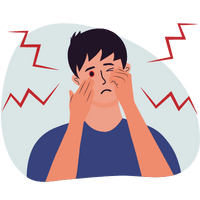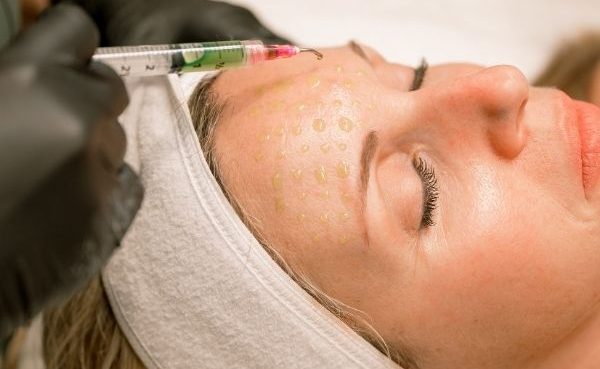The Sun Leaves Its Mark – But It Doesn’t Have to Stay Forever
Dark spots, also known as hyperpigmentation, can appear as flat, brown, black, or gray areas on the skin. They most commonly develop on parts of the body that are frequently exposed to the sun, such as the face, hands, shoulders, and décolletage.
Sun damage refers to a broader range of skin changes caused by UV exposure over time. In addition to dark spots, sun damage can cause fine lines, wrinkles, rough texture, dryness, and even visible blood vessels. It accelerates the skin’s natural aging process, often referred to as photoaging.
While these skin changes are usually not harmful, they can impact your confidence and are often a visible sign of skin neglect. Fortunately, they can be treated effectively and prevented with the right skincare and professional treatments.

Several factors contribute to the development of dark spots and sun damage, including:

UV rays trigger excess melanin, leading to sunspots and long-term skin damage.

Hormones during pregnancy or from birth control can stimulate pigmentation like melasma.

Acne, cuts, or burns can leave behind dark marks as the skin heals.

Older skin repairs more slowly, making sun damage and dark spots more noticeable.

Some drugs and cosmetics increase sun sensitivity, leading to discoloration.

Your skin type and family history can make you more prone to pigmentation.
Dark spots and sun damage shouldn’t dull your glow—our expert treatments will restore your skin’s clarity, even tone, and natural radiance.


Why settle for cover-ups when you can correct the cause? These expert treatments fade dark spots and restore your skin’s natural luminosity from the inside out
Deep Exfoliation Without Harsh Peeling – Gently removes dead, damaged skin cells to lighten dark spots and improve overall tone and texture.
Stimulates Collagen and Skin Renewal – Boosts skin regeneration to repair sun damage and support a fresher, more youthful appearance.
Improves Overall Skin Glow and Brightness – Reveals healthier, radiant skin while reducing visible pigmentation.
Minimal to No Downtime – Ideal for those seeking effective results without interrupting their daily routine.
Targets Pigmentation at the Source – Regulates melanin production to correct existing dark spots and prevent future ones from forming.
Highly Effective for Stubborn Pigmentation – Proven to treat melasma, sun spots, post-inflammatory hyperpigmentation, and uneven skin tone.
Delivers Progressive, Long-Term Results – Continues to improve skin clarity and brightness over time with proper aftercare.
Restores Skin Health and Radiance – Improves texture, balances oil production, and strengthens the skin barrier for a fresher, more even look.
Professional treatments like BioRePeel and Cosmelan Peel fade dark spots by exfoliating damaged skin and regulating melanin, combine with daily SPF and pigment-correcting skincare for best results.
Sun damage spots may fade over time but usually don’t disappear completely without treatment.
Yes, vitamin C can help fade dark spots by brightening the skin and reducing excess melanin production.
DermaPrecision offers expert medical aesthetic treatments, including Botox, Dermal Fillers, microneedling, and more. We focus on achieving your unique aesthetic goals and promoting ultimate skin health.


